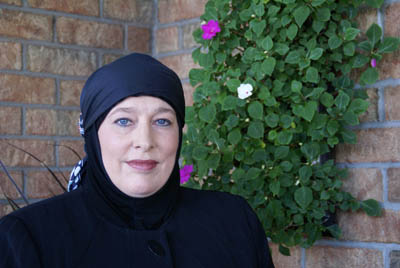
(RNS4-OCT03) Yvonne Ridley is a British journalist who converted to Islam after being held
captive by the Taliban in Afghanistan. For use with RNS-10-MINUTES, transmitted Oct. 3, 2007.
Religion News Service photo by Ron Csillag.
(RNS) A rash of drug-related violence in Juarez, Mexico, has prompted some Christian organizations to halt educational tours that took Americans across the border from El Paso, Texas, to tour poor Juarez neighborhoods.
But it hasn’t stopped Border Immersion Experience, a program of Iglesia Luterana Cristo Rey (Christ the King Lutheran Church) in El Paso from leading visits to Juarez as part of its three- and seven-day programs that focus on border and immigration issues.
For executive director Rose Mary Sanchez-Guzman, bringing groups to Juarez despite daily murders is both a matter of Christian witness and solidarity with Mexicans who cannot leave.
Some answers have been edited for length and clarity.
Q: What is the purpose of the Border Immersion Experience?
A: The purpose is to educate people about border issues through stories, through faith and through the experience of people on both sides — in El Paso and in Juarez. The main part of our experience is relational. Participants spend a lot of time with people in the neighborhood, people in the congregation and people in Juarez.
Q: Before last year, how did program participants experience Juarez?
A: We would on a couple of mornings go to Juarez. We would visit a women’s co-op, where they make things to sell to the U.S. to help their families. People from our groups would visit the homes of women from the co-op, hear the stories from a specific family and have a meal with that family. The next day, we would go to a medical clinic that helps the most marginalized people in Juarez.
Q: How has the experience of Juarez changed in response to rising violence over the past year?
A: We no longer take groups anywhere other than to one colonia (a poor neighborhood). The nun who runs the co-op has been robbed several times at gunpoint. We used to bring groups downtown, where they could shop and see the cathedral, but we don’t do that anymore because downtown Juarez has become very dangerous. For the safety of our groups, we don’t bring them anywhere other than where we have felt safe and where it’s still OK to go.
Q: Have your groups in recent years had any direct experience with violence?
A: No, thank God. We haven’t.
Q: Now that participants don’t do as much in Juarez, what do they do instead?
A: We go to the fence between El Paso and Juarez. They hear from the Border Patrol first, where groups get to ask all kinds of questions. Once the Border Patrol leave, we visit through the fence with church members who have been deported to Mexico. Through the fence, groups hear the stories — for instance, of mothers separated from their children. We bring chairs and somebody translates. We say the Lord’s Prayer at the end. When we pray, we hold hands with a finger through the fence.
Q: Have most of your participants continued to go to Juarez? Or do most opt to stay on the U.S. side?
A: Last year, the majority stayed on the U.S. side. This year, we have had four groups so far, and two of them decided to cross. Everybody who crosses signs a release. They didn’t have to do that before last year, but now they do. The release says we cannot guarantee their safety over there.
Q: Are these trips to Juarez more meaningful to the people of Juarez, now that everyone knows Americans are taking more risks when they go?
A: Yes. People over there are very saddened by not having visitors anymore. They feel abandoned in a way. When we go there, then they feel that we are in solidarity with them. We always tell groups: “When you decide whether to go, it’s not just a decision about safety. It’s a decision about solidarity with people who have no choice but to be there.”
Q: Is the ministry as effective as it was when it was easier to visit Juarez? Is it diminished by these circumstances?
A: We have a lot of meaningful programs that we can do here. The experience at the fence has become a very powerful experience.
Q: Are you fearful when you go to Juarez?
A: I am. But I still go. We take precautions. We don’t go downtown anymore. It’s just normal for us to hear that there were 10 dead people this week, 24 dead people just last week. We get used to the news. It’s just normal for us to hear what’s happening over there.




